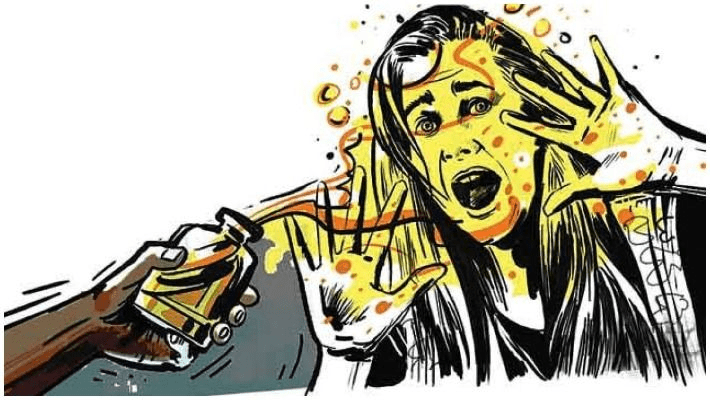Description

Copyright infringement not intended
In News
- Recently a 17-year-old girl was attacked with an acid-like substance in Delhi while she was on her way to school. The incident has once again initiated a debate on the heinous crime of acid attacks and the easy availability of corrosive substances.
Acid Attack
- An acid attack is a form of violent assault involving the act of throwing acid or a similarly corrosive substance onto the body of another to disfigure, torture, or kill.
- The most common types of acid used in these attacks are sulfuric, nitric acid, and Hydrochloric acid.
- Aqueous solutions of strongly alkaline materials, such as caustic soda (sodium hydroxide), are used as well, particularly in areas where strong acids are controlled substances.
- Perpetrators throw corrosive liquids at their victims, usually at their faces, burning them, and damaging skin tissue, often exposing and sometimes dissolving the bones.
- Acid attacks can lead to permanent, partial, or complete blindness, with severe permanent scarring of the face and body, along with far-reaching social, psychological, and economic difficulties.
- Acid attacks are reported in many parts of the world, but this type of violence is most common in South Asia.
.jpg)
Acid attacks in India
- According to the National Crime Records Bureau (NCRB); 150 acid attack cases were recorded in 2019, 105 in 2020 and 102 in 2021.
- West Bengal and UP recorded nearly 50% of all the cases in the country.
- In 2020, the charge sheeting rate of acid attacks stood at 86% and the conviction rate at 72%.
- In 2021, it stood at 89% and 20% respectively.
- In 2015, the Union Ministry of Home Affairs issued an advisory to all states to ensure speedy justice in cases of acid attacks by expediting prosecution.
Law related to acid attacks in India
- Until 2013, acid attacks were not treated as separate crimes, with an amendment made in the IPC, acid attacks were made punishable with a minimum of 10 years of imprisonment which can be extendable to a life term with a fine.
- Under the law, there are also provisions for punishment for denial of treatment to victims or police officers refusing to register an FIR or record any piece of evidence.
- Denial of treatment (by both public and private hospitals) can lead to imprisonment of up to one year and negligence of duty by a police officer is punishable by imprisonment of up to two years.
- Regulation of acid sales
- In 2013, the Supreme Court passed an order on the regulation of sales of corrosive substances. Based on the order, the Home Ministry issued an advisory to all states on how to regulate acid sales and also framed the Model Poisons Possession and Sale Rules, 2013 under The Poisons Act, 1919.
- According to the Home Ministry rule, over-the-counter sale of acid was not allowed unless the seller maintains a logbook/register recording the sale of acid. This logbook was to also contain the details of the person to whom acid is sold, the quantity sold, the address of the person and also specify the reason for procuring acid.
- The sale is also to be made only when the buyer produces a photo ID containing his address issued by the government. The buyer must also prove he/she is above 18 years of age.
- Sellers are also required to declare all stocks of acid with the concerned Sub-Divisional Magistrate (SDM) within 15 days and in case of undeclared stock of acid. The SDM can confiscate the stock and suitably impose a fine of up to Rs 50,000 for a breach of any of the directions.
- Educational institutions, research laboratories, hospitals, government departments and the departments of Public Sector Undertakings, which are required to keep and store acid, have to maintain a register of usage of acid and file the same with the concerned SDM.
- Victim compensation and care
- Based on Supreme Court directions, the Home Ministry asked states to make sure acid attack victims are paid compensation of at least Rs. 3 lakhs by the concerned State Government/Union Territory as the aftercare and rehabilitation cost.
- States are supposed to ensure that treatment provided to acid attack victims in any hospital, public or private, is free of cost.
- The cost incurred on treatment is not to be included in the compensation given to the victim.
- Home Ministry suggested states should also extend social integration programs to the victims for which NGOs could be funded to exclusively look after their rehabilitative requirements.
.jpg)
Way Forward
- The regulations on acid sales largely help in tracking the accused and not so much in prevention. Acid is still easily available in many places.
- India has several laws and rules to curb acid attacks, but the problem is the implementation of the law, and the presence of an unregulated market.
- India can learn from Bangladesh: The case study of Bangladesh shows that crime can be curbed with strict implementation of the law, In 2002, the country passed strict legislation against perpetrators and regulation of acid sales, now the Situation improving in Bangladeshi the rate of cases declining by 15–20% every year.
- The key to solving this problem will always remain in society.
- Parents must teach their children the importance of boundaries and consent.
- Strict implementation of the law and promotion of education and social awareness could help us to get rid of this social crime against Humanity.
https://indianexpress.com/article/explained/delhi-acid-attack-case-laws-on-sale-8327577/






.jpg)








